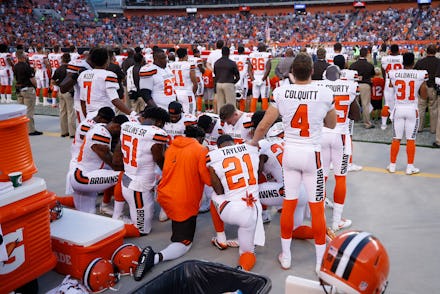Colin Kaepernick still has no job — but the NFL can’t escape his influence

Colin Kaepernick still doesn’t have a job in the NFL, but the league can’t seem to get rid of him. At a preseason game in Cleveland Monday night, roughly a dozen Browns players took a knee during the United States national anthem that plays before every game — the largest such demonstration to date, according to reports.
The protest was an act of solidarity with Kaepernick, who faced vitriol from fans when he protested racism by kneeling during the song starting in August 2016.
“It saddens me that, in 2017, we have to do something like that,” Browns tight end Seth DeValve said after kneeling before Monday’s game. “The issue is that [the U.S.] doesn’t provide equal opportunity to everybody ... and I wanted to support my African-American teammates today.”
With Monday’s protest, DeValve became the first white player to kneel in what became a league-spanning demonstration last year, which had previously consisted of black players only. His involvement is a testament to the influence Kaepernick still wields over the NFL’s political culture — even though Kap isn’t technically part of the league anymore.
No organization has signed the former-San Francisco 49ers quarterback to a contract since he became a free agent in March, with pundits and players alike citing his outspokenness as the reason why. Some have suggested that teams are avoiding him because they see him as a “distraction.” But if Monday’s sizable protest is an indication, the NFL’s real Kaepernick problem is only getting started.
“I am not going to stand up to show pride in a flag for a country that oppresses black people and people of color,” the ex-Niner explained to NFL Media after one of his first protests on Aug. 26. “To me, this is bigger than football and it would be selfish on my part to look the other way. There are bodies in the street and people getting paid leave and getting away with murder.”
Depending on who you talk to, Kaepernick has spent the past year either alienating or endearing himself to observers with comments like this. Kneeling during the anthem was step one. The 29-year-old dove head-first into racial justice work as well, donating hundreds of thousands of dollars to activist organizations like Grassroots Leadership — which works to abolish private prisons — and the Chicago-based radical black women’s group Assata’s Daughters, which was instrumental in ousting former-Cook County State’s Attorney Anita Alvarez last year after she took a year to charge a Chicago police officer for killing Laquan McDonald.
While New York Giants fans were writing letters to team owner John Mara begging him not to sign Kaepernick, the QB was in their backyard, donating custom-made suits to an anti-recidivism organization in Queens to help men who’d been incarcerated get jobs. The contrast exposed a growing moral rift between Kaepernick and his detractors. As angry fans and members of the right-wing media lambasted the quarterback for agitating against racism, an energized white supremacist movement — emboldened by the GOP and President Donald Trump — grew more vocal by the day.
The gap was apparent within the NFL too, as the league proved in recent years by dragging its feet during its investigation into Ray Rice’s 2014 assault on his then-fiancée Janay Rice. The NFL’s dismal record on domestic violence continued when the Dallas Cowboys signed Greg Hardy after the defensive end was arrested for brutally beating his ex-girlfriend Nicole Holder, also in 2014. Neither player was dubbed a “distraction” while he was playing. Kaepernick, on the other hand, was rewarded with unemployment for his peaceful advocacy.
But this hasn’t stopped Kaepernick’s voice from cutting through the mire. Several players have joined his protest over the past season and into the 2017 preseason, including members of the Miami Dolphins, Kansas City Chiefs, a handful of fellow 49ers and, most recently, Marshawn Lynch, Michael Bennett and the Cleveland Browns cadre. Dozens of NYPD officers rallied Saturday to support the QB. Civil rights groups, including the NAACP, have announced boycotts against the NFL.
Rather than fading with Kaepernick’s job prospects, the demonstrations he sparked have only grown in relevance — especially after white supremacist rallies in Charlottesville, Virginia, claimed 32-year-old counterprotester Heather Heyer’s life, and saw Trump respond tepidly to calls to condemn the hate groups.
The irony is that NFL teams thought they could avoid Kaepernick’s politics by refusing to sign him. In reality, they have only strengthened his call to arms, galvanized his supporters and drawn attention to the injustice of the backlash against him. Through their reticence, NFL teams have made Kaepernick one of the most powerful figures in sports. And they’ve done so while standing tacitly beside those who are silent, while black people are being gunned down by police in staggering numbers.
History will not treat them kindly.